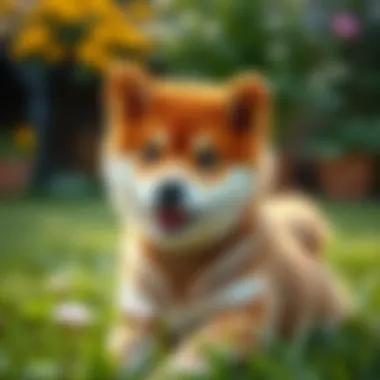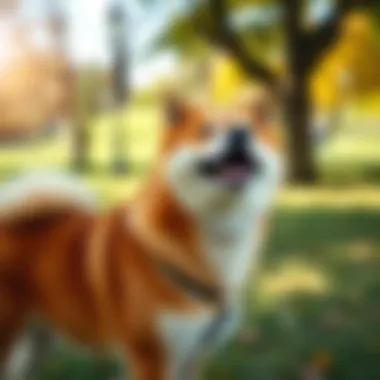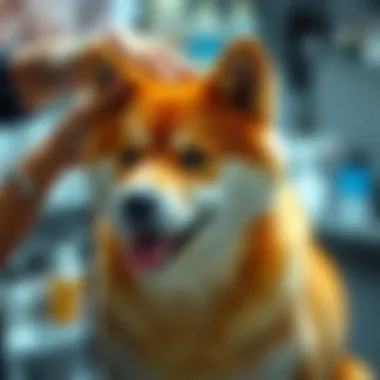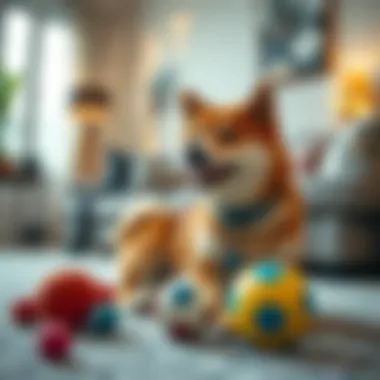How to Buy a Shiba Inu Dog: A Comprehensive Guide


Intro
Bringing a new dog into your life is a significant endeavor, especially when it comes to a breed as spirited and distinct as the Shiba Inu. Known for their fox-like appearance and spirited disposition, Shiba Inus require careful consideration before purchasing. This guide is crafted to untangle the intricate web of decisions and details involved in the journey of acquiring a Shiba Inu dog. From understanding breed traits to sourcing responsibly, and aligning this decision with your daily life routines, this comprehensive guide serves to equip potential Shiba Inu owners with the knowledge needed to proceed wisely.
In this guide, you will discover:
- What makes the Shiba Inu unique
- Financial aspects and commitments involved
- How to find reputable breeders or consider adopting
- Assessing your lifestyle compatibility with this lively little dog
Navigating the landscape of dog ownership can be daunting, but with the right information at hand, prospective owners can sidestep common pitfalls and ultimately forge a fulfilling relationship with their new furry friend. Let's dive into the details.
Understanding the Shiba Inu Breed
Before diving into the nitty-gritty of purchasing a Shiba Inu, it’s essential to understand the breed itself. This kind of knowledge allows potential owners to make informed decisions and find a furry companion that truly fits their lifestyle and expectations. Shiba Inus are unique, not just in their appearance but in their behavior and needs. Grasping these aspects can prevent future disillusionment and ensure a harmonious relationship.
Origin and History
The history of the Shiba Inu is a fascinating journey that dates back thousands of years. Originating in Japan, they were bred for hunting small game in the mountainous regions of the country. Their name translates directly to "small dog," which is quite fitting given their compact size. Shibas are one of the oldest and smallest native breeds in Japan, with their lineage tracing back to around 300 B.C.
Over the centuries, they have survived various trials, including World War II, which greatly reduced their population. Thankfully, dedicated efforts in breeding and conservation have revitalized the breed. Today, their charming appearance and spirited nature have made them one of the most loved dog breeds worldwide.
"The Shiba Inu is a piece of history manifested in the form of a pet that embodies endurance and tradition."
Temperament and Personality Traits
Understanding the temperament of a Shiba Inu is fundamental in deciding whether this breed is suitable for you. Shibas are often described as spirited and bold, with an independent streak that can be mistaken for stubbornness. They have a strong will and are known to test boundaries. This personality trait can be both endearing and frustrating.
These dogs are generally alert and can be reserved around strangers, making them excellent watchdogs. They are highly intelligent and, when properly trained, can excel at various dog sports or obedience tasks. However, potential owners should be ready for a dog that requires both mental and physical stimulation. Shiba Inus thrive on interaction and can become bored easily, leading to unwanted behaviors if not engaged.
Physical Characteristics and Health Issues
When you think of a Shiba Inu, the first thing that probably comes to mind is their distinct appearance. With a fluffy double coat, erect ears, and a curled tail, they are exceptionally appealing. Typically, Shiba Inus weigh between 17 to 23 pounds and stand about 13.5 to 16.5 inches tall at the shoulder, making them a manageable size for many homes.
However, it’s vital to be aware of certain health concers associated with the breed. Shiba Inus can be prone to conditions such as hip dysplasia, patellar luxation, and certain eye disorders. Regular veterinary check-ups and preventive care are essential to ensuring a healthy life for your furry friend. Being informed about these potential health issues can shape decisions regarding grooming, diet, and veterinary care in the long run.
Understanding the history, temperament, and health of Shiba Inus provides a solid foundation for potential owners. Investing time into understanding these factors not only helps in the buying process but also fosters a meaningful relationship with your future pet.
Assessing Your Readiness for a Shiba Inu
Purchasing a dog is a significant undertaking, and assessing your readiness for a Shiba Inu is an essential first step. Unlike more common breeds, Shiba Inus have distinct personality traits and needs that require careful consideration. This section aims to shine a light on the vital elements that you should evaluate before making the jump into pet ownership.
Lifestyle Compatibility
One of the first things to assess is whether your lifestyle aligns with the natural tendencies and needs of a Shiba Inu. These dogs are known for their spirited personalities and independent nature.
- Active Lifestyle: Shiba Inus thrive in environments where they can partake in regular exercise. If you lead an active life or enjoy spending time outdoors, that’s a good match. A daily routine that includes walks, playtime, or dog-friendly activities can foster a healthy bond.
- Space Requirements: Living arrangements also play a crucial role. Shiba Inus are not particularly suited for tiny apartments without access to outdoor space. Ideally, they need room to roam and explore.
- Family Dynamics: If you have children or other pets, consider how a Shiba Inu might fit into that dynamic. Their sometimes stubborn or aloof temperament may not blend seamlessly with every household.
Time Commitment


Owning a Shiba Inu isn’t just about cuddles and companionship; it's about commitment. These dogs, while independent, require attention and consistent training. Here are a few aspects to consider:
- Training Needs: Shiba Inus can be challenging to train due to their strong-willed nature. Be ready to invest time in obedience training and socialization to cultivate good behavior.
- Daily Care: Regular grooming, exercise, and feeding are requirements that demand your time daily. Incorporating these tasks into your routine is necessary to keep your Shiba Inu healthy and happy.
- Emotional Commitment: Just like humans, dogs need emotional support. Be prepared to invest time for bonding and emotional connection.
Financial Considerations
Owning a Shiba Inu can be a joyous experience, but it's important to be aware of the financial implications involved. The costs can add up quickly, so consider the following:
- Initial Purchase Costs: The price of a Shiba Inu from a reputable breeder or shelter can vary significantly, typically ranging from several hundred to several thousand dollars.
- Ongoing Expenses: Day-to-day costs, including high-quality dog food, grooming supplies, and preventive healthcare, are necessary. Regular vet checkups, vaccinations, and emergency visits can further impact your budget.
- Training and Socialization: Additionally, investing in professional training or dog classes can be beneficial. This can range from basic obedience to specialized training tailored to breed specifics.
Assessing your readiness involves more than just answering a checklist; it’s about understanding the commitment you are about to undertake.
In summary, before adding a Shiba Inu to your family, take a moment to reflect deeply upon your lifestyle compatibility, time commitment, and the financial responsibilities that come with pet ownership. Being honest with yourself will pave the way for a fulfilling relationship with your future furry companion.
For further information on responsible pet ownership, please visit resources like the American Kennel Club or Petfinder for community insights.
Finding Reputable Sources
When you decide to welcome a Shiba Inu into your home, one of the most crucial steps is finding a reliable source to obtain your new companion. This process is not just about picking a cute puppy; it's about ensuring you choose a healthy, well-socialized, and ethically raised dog. Opting for the right source can save you plenty of heartache and financial stress down the road. Here's a look at some important elements to consider when searching for reputable sources.
Breeders vs. Shelters: Weighing Your Options
Choosing between a breeder and a shelter is not a straightforward decision; each option comes with its pros and cons. Understanding these distinctions can help you make an informed move.
- Breeders: Often, breeders specialize in Shiba Inus, ensuring you get a purebred dog. A reputable breeder will focus on health, temperament, and conformation to breed standards. However, prices can be steep.
- Shelters: On the other hand, shelters and rescue organizations offer another path. By adopting a Shiba Inu from a shelter, you are giving a dog a second chance. Shelter fees are typically lower than purchasing from a breeder, but dogs there might not come with a full health history.
Ultimately, think about your priorities. Do you want a specific lineage and breed traits or are you open to adopting a mixed breed? Each option has its merits.
Identifying Ethical Breeders
If you lean towards purchasing from a breeder, it's essential to ensure they meet ethical standards.
- Health Screening: Ask about health tests for common issues in Shiba Inus, such as hip dysplasia and eye disorders. Ethical breeders often conduct these tests on their breeding stock and should be willing to share results.
- Living Conditions: Pay a visit to the breeder's facility if possible. Observe the environment where the puppies are raised; it should be clean, spacious, and well-kept.
- Socialization Practices: An ethical breeder places importance on socializing puppies with various stimuli, helping them develop into well-adjusted adults. They should also demonstrate proper handling techniques without harsh training methods.
"A good breeder prides themselves on the quality of their puppies and the satisfaction of their families."
Adoption and Rescue Organizations
Adopting from a rescue organization or shelter can be a rewarding experience, not to mention the impact it has on the lives of these dogs. Here’s what to consider:
- Supportive Environment: Many rescue organizations take in dogs from difficult situations and foster them before adoption. These organizations are usually backed by experienced volunteers who can provide insight on the dog's background and temperament.
- Lower Cost: Adoption fees can be significantly cheaper than buying from breeders, covering spay/neuter and vaccinations, which can save you some financial strain.
- Diverse Options: Sometimes, shelters might have Shiba Inus or similar breeds at no cost or a reduced fee. Additionally, mixed breeds often come with fewer hereditary health problems since genetic diversity can provide stronger health outcomes.
When considering adoption, be sure to ask about the dog’s history, any behavioral issues, and whether he's been socialized properly.
The Buying Process
The buying process for a Shiba Inu dog is not merely a transaction; it's a pivotal phase that sets the foundation for your relationship with your future pet. Understanding how to navigate through this stage efficiently is crucial. It helps potential owners identify not just the dog that fits their lifestyle but also the responsible sourcing of that animal. This section addresses important elements that encompass the buying journey, ensuring that it is both smooth and knowledgeable.
Questions to Ask Breeders or Shelters


When you set foot into a breeder's facility or a shelter, it's like stepping into a treasure trove of potential new friends, but it can also be a bit overwhelming. Having a clear set of questions can alleviate that stress and provide clarity about the puppy or dog you're considering. Here’s a list of insightful inquiries to make:
- Health Records: What vaccinations has the dog received? Are there any known health issues?
- Parent Breed: Can you provide information about the parents? How are their temperaments?
- Socialization: How has the dog been socialized? Has it been exposed to other animals and people?
- Returning Process: What happens if the dog doesn't fit in with our family? Can we return it?
- Costs: Are there any hidden costs after the initial purchase? What is included in the price?
Asking these questions not only highlights your interest but also helps you gauge the ethics of the breeder or shelter. It often reflects their knowledge and care for the animals they handle.
Evaluating the Living Conditions
Just as a fish needs a suitable tank to thrive, a Shiba Inu needs an environment that nurtures its well-being. When visiting a breeder or shelter, evaluating the living conditions is non-negotiable. Here are some key aspects to observe:
- Cleanliness: Is the space tidy? A well-maintained area is often a hallmark of responsible practices.
- Social Interactions: Observe how staff interact with the dogs. Are they affectionate and attentive?
- Exercise Areas: Is there ample outdoor space for dogs to roam and play? Shiba Inus require physical activity to maintain their mental health.
- Housing: Are the dogs kept in humane conditions with easy access to food, water, and shelter?
Surveying the environment where the dog has been raised sheds light on its past experiences. It’s fundamental for raising a well-adjusted pet.
Understanding Contracts and Guarantees
Once you decide on a dog, the process moves towards paperwork. Contracts and guarantees are often overlooked, yet they area significant aspect of the buying process. Here’s what to look out for:
- Health Guarantees: Does the contract include a health guarantee? This assures you that you're purchasing a dog with known health conditions addressed.
- Terms of Sale: What does the contract stipulate regarding the return policy? Ensure you fully understand these terms before sealing the deal.
- Spay/Neuter Clauses: Some breeders may require you to spay or neuter your dog by a specific age. This is commonly done for responsible pet ownership.
- Liability Waivers: Be cautious of liability clauses. Understand your rights and responsibilities regarding accidents that may occur.
Reading every clause in the contract may seem tedious, but it’s necessary. It protects you and the dog in the long run, fostering a responsible ownership model.
"Due diligence at the time of purchase not only safeguards your interests but contributes positively to responsible breeding practices."
Each step in the buying process is more than transactional; it’s about securing a companion that fits into your life while ensuring that ethical breeding practices are upheld. As you move through this stage, remember that your responsibility as a prospective owner begins the moment you consider adding a Shiba Inu to your family.
Post-Purchase Responsibilities
After you find that furry companion and bring a Shiba Inu into your home, the journey doesn't stop there. In fact, this is just the beginning. Knowing how to care for your new dog goes beyond feeding or occasional walks; it’s about forging a bond and ensuring its well-being. Post-purchase responsibilities involve nurturing both the dog and the relationship you develop.
It is essential to address various aspects that help you and your new pet to adjust to life together smoothly. Not only will this enhance your dog's quality of life, but it also provides you with a priceless companionship that can enrich your days.
Initial Care and Acclimatization
Once you bring your Shiba Inu home, the first few days are critical. Like a child starting at a new school, the dog needs time to settle into its new environment. Start by creating a safe space for your dog to roam and explore.
- Establish a Routine: Dogs, much like us, thrive with structured days. Set regular times for feeding, walks, and play. This also helps with potty training.
- Introduce Family Members Slowly: Give your Shiba some space to get comfortable. You want to avoid overwhelming it from the get-go. Gradually let family members interact, allowing the dog to engage at its own pace.
- Safe Spaces: Make sure to have a cozy spot where your dog can retreat. A bed in a quiet corner can serve them well when they need some downtime after the excitement of their new home.
These small steps can make your Shiba feel more at ease and prevent unnecessary anxiety for both of you.
Healthcare Needs and Regular Check-ups
Taking care of your Shiba Inu's health is a top priority. As with any pet, health concerns can arise, and regular veterinary check-ups become non-negotiable. Shibas are generally healthy, but some breed-specific issues can pop up.
- Vaccinations: Keep up with required vaccinations based on your vet’s advice. It helps protect your dog against various diseases.
- Regular Check-ups: Annual visits to the vet are crucial. They can catch any early signs of problems.
- Dental Care: Don’t overlook dental hygiene. Bad breath isn't just unpleasant; it can lead to health issues. Regular teeth cleaning helps.
- Parasite Control: Discuss preventative measures for fleas, ticks, and worms with your vet. Staying one step ahead helps keep your Shiba healthy.
Regular veterinary care ensures your pup has the chance to live a long, happy life.


Training and Socialization
Training is not just about commands; it’s about shaping behavior and establishing good habits. Shiba Inus are known to have strong personalities and can sometimes be a handful, so structured training is crucial.
- Basic Commands: Start with essential commands like "sit," "stay," and "come." Begin in a quiet environment with few distractions.
- Positive Reinforcement: Use treats and praise as incentives. This method is more effective than punishment-based training.
- Socialization: Introduce your Shiba to different environments, people, and other animals. This reduces unnecessary fear or aggression later on. Consider enrolling in a puppy socialization class.
- Consistency is Key: Just like any good habit, repeating commands and maintaining a schedule help cement behavior.
Training can take time, and patience is key. The right approach fosters a strong bond between you and gradually transforms your Shiba Inu into a delightful companion.
Common Challenges and Solutions
When bringing a Shiba Inu into your home, understanding that challenges may arise is crucial. This section addresses common issues that new owners face, providing insights into potential obstacles and practical solutions. Being well-prepared can foster a nurturing and rewarding environment for both you and your pet.
Behavioral Issues
Shiba Inus are known for their spirited and sometimes stubborn demeanor. These dogs have a strong will, which, while endearing, can lead to challenges in training and obedience. For instance, they might ignore commands if they feel it’s not worth their while. This is due in part to their background as hunting dogs in Japan, where independence is a key trait.
To address behavioral issues, early and consistent training is essential. Here are a few methods that might help:
- Positive Reinforcement: Use treats and praise to encourage good behavior rather than punitive measures.
- Consistency: Make sure everyone in the household applies the same commands and rules.
- Socialization: Expose your Shiba Inu to different environments, people, and other dogs from a young age to reduce aggressive tendencies.
- Patience is Key: Don’t expect immediate results. It takes time for your Shiba Inu to learn and adapt.
"Training a Shiba Inu can feel like teaching a cat to fetch—challenging but not impossible."
Health Concerns Specific to Shiba Inus
Like all breeds, Shiba Inus come with their own set of health predispositions. They are generally hardy, but certain genetic issues do crop up. Common health problems to be aware of include:
- Hip Dysplasia: A common problem in many dog breeds, it can lead to arthritis if not managed. Regular vet check-ups can help catch this early.
- Patellar Luxation: This condition can lead to limping or difficulty moving; early intervention through veterinary care is crucial.
- Eye Issues: Conditions like cataracts and glaucoma are seen more frequently in Shiba Inus, so regular eye examinations should not be overlooked.
Keeping tabs on your pup’s health will prevent minor issues from spiraling into serious concerns. Don't skimp on routine vet visits, as these are fundamental for catching any health problems early on.
Adjusting to Life Together
Integrating a Shiba Inu into your household can be a fine balancing act. While they are generally affectionate, their independent nature sometimes makes for a bumpy beginning. Understanding their need for space, combined with ensuring they feel secure, lays the groundwork for a harmonious relationship.
- Establish Boundaries: From day one, it’s important to teach your Shiba their boundaries. This includes commands like "sit" and "stay."
- Create a Safe Space: Provide a designated area where your Shiba can retreat when overwhelmed. This helps them acclimatize to their new environment.
- Engage in Activities Together: Find activities that both you and your Shiba enjoy—be it long walks or puzzle toys designed to stimulate their minds.
Remember, patience is paramount when adjusting to life together. Expect some bumps along the road, but with diligence and care, you can nurture a loving bond that both you and your Shiba Inu will cherish.
End
In the journey of acquiring a Shiba Inu, the conclusion serves as a vital culmination of all we've explored. The path to finding this spirited breed doesn’t merely wrap up with the purchase; it marks the beginning of a lifelong relationship that deserves careful consideration and understanding.
Embracing the Journey of Pet Ownership
Choosing to bring a Shiba Inu into your life is not just about having a cute dog around—it's about embracing the multifaceted nature of pet ownership. Every dog has its quirks, shadows, and light moments, and the Shiba Inu is no different. With their unique, cat-like independence and spirited personalities, they add flavor to your daily routine.
Investing time in training and socialization is essential; neglecting this can lead to behavioral issues down the road. The Shiba Inu’s strong-willed nature requires a devoted owner who understands the fine balance between guidance and freedom. Training becomes not just a chore, but a joint adventure that strengthens your bond.
Moreover, health considerations can't be overlooked. Routine vet check-ups, proper nutrition, and mental stimulation can pave the way for a healthy life for your Shiba Inu. These dogs are prone to some health concerns, like hip dysplasia and patellar luxation, so health awareness is critical.
When you commit to a Shiba Inu, you're also pledging to a lifestyle change. You may find yourself waking up a tad earlier for walks or considering pet-friendly travel options. That said, the joy and unconditional love they provide far outweigh the adjustments. Every wag of their tail, every playful bark is a reminder that these little furballs enrich our lives in ways that are hard to quantify.
In essence, becoming a Shiba Inu owner is a commitment to understanding, patience, and respect for the breed.
So as you wrap your head around the points we discussed, remember that the ownership journey flourishes with empathy and dedication. It’s not merely about buying a dog; it’s an engagement with life that promises adventure, learning, and unconditional love. Equipping yourself with knowledge and preparing for the responsibilities ensures that you and your Shiba Inu can forge a bond that's both tough and tender.















